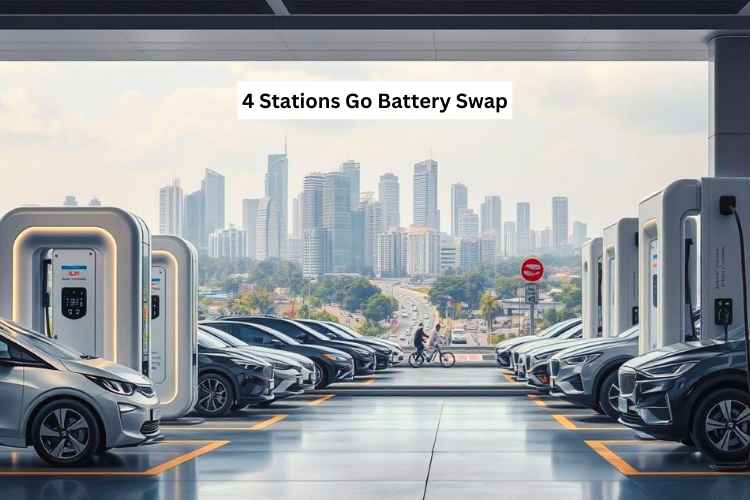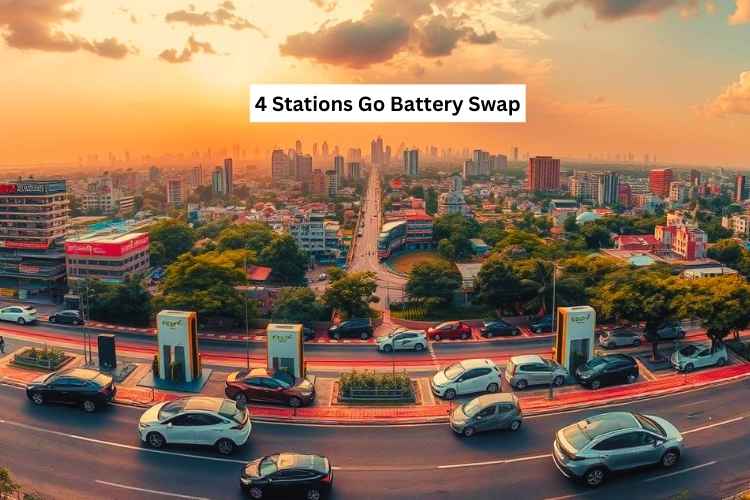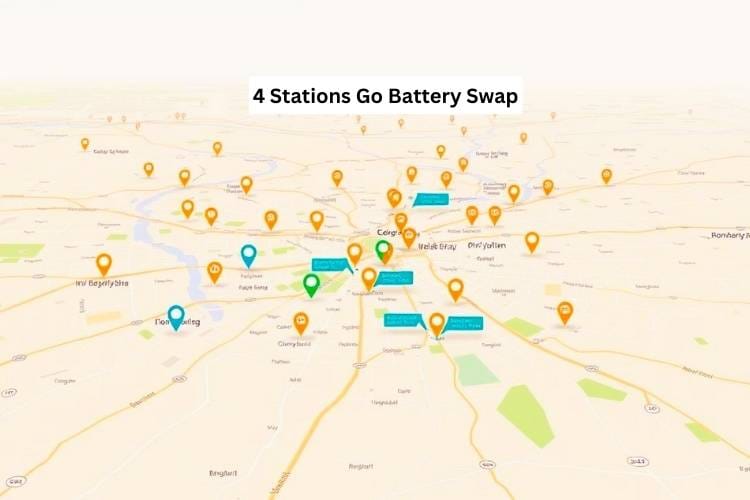4 Stations Go Battery Swap: Did you know that a fully charged electric vehicle battery can take up to eight hours to recharge? But with Bengaluru’s new battery swap stations, drivers can swap in under two minutes. This change is now a reality, with the city adding four new battery swap stations to its EV infrastructure.
As someone who’s tracked India’s green mobility push, I’m excited to show how these stations are solving two big hurdles. They tackle long charge times and range anxiety for electric vehicles in Bengaluru.
These four stations mark a bold step toward sustainable transportation. Unlike traditional charging, battery swap technology lets drivers skip waiting entirely. They simply swap a depleted battery for a charged one at these EV infrastructure hubs.

This tech isn’t just faster; it’s a win for drivers and the environment. With Bengaluru’s electric vehicles in Bengaluru growing, this move could cut charging downtime citywide.
Table of Contents
4 Stations Go Battery Swap: Key Takeaways
- Bengaluru now has four operational battery swap stations, slashing EV charging time to under two minutes.
- Battery swap technology supports sustainable transportation by reducing reliance on slow charging methods.
- These stations align with India’s push for green mobility, encouraging more drivers to adopt electric vehicles.
- Compatibility with popular EV models means many drivers can already use the new infrastructure.
- Cost savings on energy and time make this a practical choice for daily commuters.
4 Stations Go Battery Swap: Understanding the Battery Swap Revolution in Urban Mobility

When it comes to battery swap vs charging, the choice is clear for time-conscious drivers. Traditional EV charging can take hours. But quick battery replacement cuts this process to minutes. This EV charging alternative changes how we travel in cities like Bengaluru.
How Battery Swapping Works Differently
Battery swapping uses standardized packs that fit into compatible vehicles. This system eliminates range anxiety. It meets the needs of urban EV infrastructure.
Imagine driving into a station and having your drained battery swapped in under 5 minutes. No waiting, no wires. This approach supports EV ownership economics by separating the car’s purchase from battery costs.
Why Cost Matters in EV Ownership
Reduced upfront costs make EVs more accessible. With battery-as-a-service, consumers lease batteries via subscription models for EVs. This lowers initial expenses by up to 30%.
Here’s how it works:
- No battery purchase is needed at the time of vehicle purchase
- Professional maintenance extends battery lifespan
- Predictable monthly costs through subscription plans
These battery swap cost benefits address a key barrier to EV adoption in India’s price-sensitive market.
Learning from Global Leaders
“Battery swapping isn’t just faster—it’s a smarter way to power cities.”
Taiwan’s Gogoro network proves this model works at scale. Their successful EV swap programs now power over 2.5 million vehicles. This shows how international battery swap models can drive adoption.
Israel’s ChargePoint partnerships also highlight EV infrastructure innovations that Bengaluru can adapt. These battery swap case studies confirm that this tech isn’t just a trend. It’s a proven solution for global electric mobility challenges.
Bengaluru’s EV Leap: 4 Stations Go Battery Swap

Bengaluru has launched four new battery swap stations under Karnataka’s EV policy. This move is changing Indian urban mobility. The state government teamed up with EV leaders like Ather Energy and Nuvve to make this happen.
These stations are key to Bengaluru’s Bengaluru EV infrastructure. They can serve 500 vehicles every day. This helps reduce the need for traditional charging.
The stations use batteries that fit all EV models, from bikes to scooters. The government aims to link important areas like Electronic City and Brigade Gateway with a green transportation corridor. By 2025, they plan to have 50+ stations, making Bengaluru a leader in smart city initiatives.
“This is just the start. We’re building a network that prioritizes sustainability and convenience,” said a Karnataka Transport Department official. “These stations prove that EV adoption can scale quickly with the right infrastructure.”
Drivers can swap batteries in just 30 seconds. They can pay easily through the state’s digital portal. This move also supports India’s goal for more renewable energy, with solar-powered stations to reduce emissions.
Karnataka wants to see 10,000 EVs on the road by 2024. This isn’t just about swapping batteries. It’s about making cities grow while staying green.
How to Utilize Bengaluru’s New Battery Swap Infrastructure
Learning to use Bengaluru’s battery swap locations is easy. Just follow these steps.
Locating the Four Battery Swap Stations Across the City
The strategic EV infrastructure spots are easy to find. Check out Bengaluru battery swap locations at:
- Electronic City IT Park: Near Apollo Hospitals
- HSR Layout: Next to Big Bazaar
- Whitefield: Adjacent to Namma Metro Station
- Marathahalli: Behind Bengaluru International Airport
Get the EV station map at evswap.bengaluru.gov.in. All spots are open 24/7 with convenient swap points and free parking.
Step-by-Step Guide to Your First Battery Swap Experience
Here’s what to do for your first-time EV battery swap:
- Arrive at the station and open the app
- Position your vehicle per the guide markers
- Scan the QR code or tap the NFC reader
- Watch the automated battery exchange steps take 90 seconds
- Verify new battery status via the dashboard
Subscription Models and Payment Options Available
There are three EV battery subscriptions:
- Pay-per-use battery: ₹50/swap (best for occasional users)
- Monthly plan: ₹1,500/month (unlimited swaps)
- Annual plan: ₹16,000/year (15% discount)
You can pay with UPI, cards, and e-wallets. Use the app’s cost calculator to compare prices.
Compatibility: Which EV Models Work With These Stations
These swap-ready vehicles are supported:
- Ather 450X (two-wheeler)
- Ola S1 (scooter)
- MG ZS EV (four-wheeler)
Make sure your vehicle uses standardized battery packs. Retrofit kits are available at battery lease plan centres like EVolve Tech in Koramangala.
Conclusion on 4 Stations Go Battery Swap
Bengaluru has opened four new battery swap stations, marking a big step towards a greener future. These stations make it easier and faster to use electric vehicles. They help daily commuters by cutting down on waiting and costs.
The city is showing that green transport can grow with urban development. It offers a cleaner option for drivers. This is a big step towards a better environment.
These stations could lead to a fast growth in electric vehicle use in Bengaluru. Imagine a city where every swap helps the environment and saves time. This change is starting now.
Residents can be part of this change by trying out these stations. It’s a chance to make a difference.
Stay updated on the latest news through the Karnataka Electric Vehicles portal. Join EV forums like eVocalize to keep up with progress. As more people use battery swapping, Bengaluru’s roads will get cleaner and more efficient.
Let’s take the first step together. Swap, save, and help make Bengaluru a smarter city.
Bhakti Rawat is a Founder & Writer of InsureMyCar360.com. This site Provides You with Information Related To the Best Auto Insurance Updates & comparisons. 🔗
